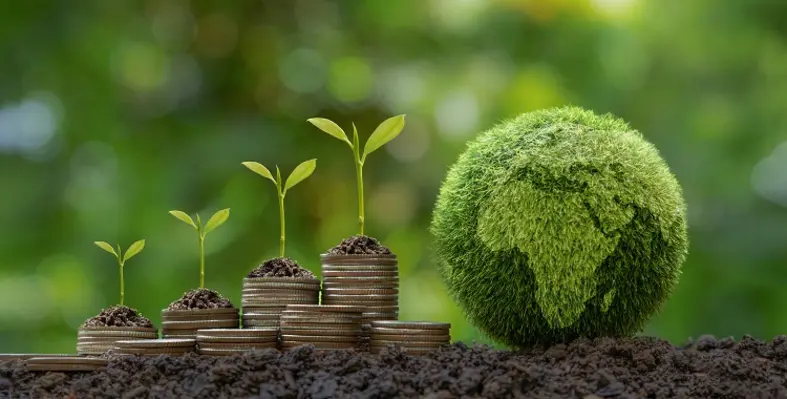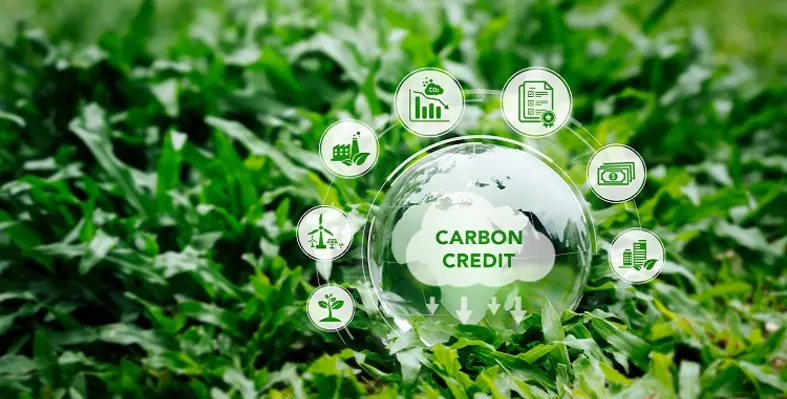Tariye Gbadegesin, co-chair of the Voluntary Carbon Markets Integrity Initiative (VCMI), explains why Africa could play an integral role in future voluntary carbon markets, positioning it as a key region in the fight against climate change
African Review: How important do you think Africa is in the global race to reduce carbon emissions?
Tariye Gbadegesin: It was encouraging to see the important role Africa can play in our collective fight to curb the effects of climate change acknowledged at this year’s Africa Climate Summit in September. At the summit, there was much discussion around unlocking capital to finance carbon credit projects in Africa and the ingredients required to increase investment in the continent and build trust.
Africa has the potential to be a leading supplier of high-quality carbon credits. The continent is home to some of the largest carbon sinks (anything that absorbs more carbon than it releases) and there has recently seen significant growth in renewable energy generation.
Clearly, these assets enable the continent to apply climate capital to reduce greenhouse gases. Some estimates put this potential reduction at 740 million tons, through 170GW of green power generation alone. And yet, low emissions and renewable energy projects are just one of many project types across the continent - biodiversity credits, cookstoves and nature-based solutions are also areas where Africa has untapped potential.
These projects crucially drive economic development. There is significant opportunity for the application of climate capital to support carbon removals and avoidance whilst also deploying capital to where it is most needed for economic development. It is possible for Africa’s economic growth to be achieved while protecting the planet – unlike global industrialisation thus far. However, this will require a new type of growth which requires finance, technology innovation and true partnership across geo-political links. The voluntary carbon market (VCM) is one of the tools that can deliver green finance while also benefitting the planet.
Africa has the capacity to create a significant amount of credits, but only if a number of crucial factors fall into place. These include:
- Rooting integrity end-to-end into the VCM system;
- Increased action from state and non-state actors, not just in Africa, but across the corporate, international multi-lateral, donor and investor communities. We need to see tangible examples of climate leadership, support for capacity building and technical assistance in project development, registration, verification, and reporting;
- A supportive and stable policy backdrop will steady the market for the project developers and communities that originate the credits, to the investors and buyers that purchase the credits. Policy makers in Africa must also decide whether, why, how, and when to engage with VCMs, and other carbon finance mechanisms, and what role these can play for their country’s climate ambition requirements;
- Transparency and equity is crucial. There is a real opportunity for the African VCM to be a truly fair and equitable market where the price of credits reflects the underlying value and the proceeds are shared equitably to include local communities, indigenous peoples and other key stakeholders who have the most to gain and potentially lose from these projects. The VCM has to be a market that works for people and the planet.
With these key factors in place, the structure of African VCM will be robust, offering a major solution that can contribute to green growth, innovation, and of course, mitigating global climate change.
African Review: Could you provide an introduction to carbon credits, the VCMI and Africa's engagement with both currently?
Tariye Gbadegesin: Carbon credits are measurable, verifiable emission reductions from certified climate action projects. These projects reduce, remove or avoid greenhouse gas (GHG) emissions. But they also bring a whole host of other positive benefits, for example, the flow of capital into countries, the empowerment of communities, the protection of ecosystems, the restoration of forests or reduction in reliance on fossil fuels.
VCMI stands for the Voluntary Markets Integrity Initiative. We are a global, multi-stakeholder initiative that builds integrity on the demand side of the voluntary carbon market, boosting buyers’ confidence to buy carbon credits as part of their decarbonization trajectory and net zero claims. In essence, our work assuages buyers’ fears of being accused of greenwashing.
The African audience will want to understand what the VCMI means to them in practical terms. We are building integrity on the demand side, enabling buyers to be more confident in their use of carbon credits, and associated claims. VCMs are not to be used as a means to allow buyers to continue business as usual emissions. Buyers need to be on a continuous downward emissions trajectory towards their net zero ambition. Carbon credits need to be part of an integrated, decarbonisation plan. Only then, when claims are credible and transparent and the market is operating with integrity, will we facilitate an increase in demand and build scale.
In June 2023, VCMI published a Claims Code of Practice to grow the confidence of companies buying carbon credits in the claims they are making. This is essentially about making sure what companies do and say with credits is transparent and credible with regards to climate action commitments they make.
This rulebook establishes integrity on the demand side of VCMs, paving the way towards regulation and making the market more robust for all. By ensuring the transparency and credibility of claims, we facilitate an increase in demand. High quality buying frameworks should also enhance carbon price and value, which have historically proven to be a problem for VCMs, which have tended to have lower pricing than compliance markets, with African VCMs suffering lower prices than their counterparts.
The African Carbon Market Initiative (ACMI), inaugurated at COP2, was established to drive an increase in the uptake of African carbon credits, both on the supply and demand side. Whilst it has seen some success and engagement, launching 13 action programmes at the start of the year to help us achieve a more rapid and just energy transition for Africa, there is still a long way to go. As it currently stands, only 2-3% of the US$2bn carbon credit market value represents Africa. This should not be the case, particularly given the continent’s strong potential to drive carbon dioxide removals and its leading position in the energy transition.
At VCMI, we are keen to support ACMI and other regional carbon initiatives and implementation bodies to build a high integrity market. We have developed an Access Strategy toolkit to help host countries, where activities that generate carbon credits take place, take the steps needed to develop a clear and stable regulatory environment. We worked with our Country Contact Group (a forum for government representatives from around the world) to understand their precise needs. It emerged the complexity of VCMs and their interactions with other sources of carbon finance often pose a barrier to engagement for governments. Our toolkit provides the necessary guidance to boost participation from these policy makers.
African Review: How can carbon credits encourage investment and mobilise finance on the continent?
Tariye Gbadegesin: A recent IPCC report highlighted that financial flows are currently 3-6 times lower than the amount needed to reach 2030 interim climate targets. This financing gap is widest in developing countries. Estimates show that Africa needs US$2.8 trillion by 2030 to fully fund the commitments that have already been announced. VCMs are both a mechanism to reduce emissions and channel finance to where it is needed most. During 2022 alone, the VCM is expected to have channeled more than US$2bn in investment flows, helping to mitigate about 161 megatons (Mt) of carbon emissions.
There are several new and emerging climate finance mechanisms which Africa is perfectly poised to leverage and adapt, and one of these is of course through the sale of carbon credits. The Voluntary Carbon Market (VCM) can be a very effective tool which can channel billions in investment that can build vibrant, green economies in Africa, while also contributing towards global climate action.
VCMs are certainly posed for potentially significant growth, which VCMI’s Claims Code of Practice can help catalyse. Some estimates say VCMs could be worth US$50bn per year by 2030.
African Review: How do you hope to encourage stakeholders on the continent to engage more with carbon credits and what are the next steps for the VCMI in Africa?
Tariye Gbadegesin: In May 2023, VCMI launched our VCM Access Strategy Toolkit. Developed in partnership with Climate Focus and the United Nations Development Programme (UNDP), the toolkit provides guidance for countries to engage in high-integrity voluntary carbon markets (VCMs) in support of climate and socio-economic prosperity. The goal of the toolkit is to help host countries, where activities that generate carbon credits take place, take the steps needed to develop a clear and stable regulatory environment. Unlocking the potential of carbon markets requires coordinated support, long-term planning and the buy-in of host countries. This is because the complexity of VCMs and their interactions with other sources of carbon finance often pose a barrier to engagement for governments. The VCM Access Strategy Toolkit provides clear strategies for engaging effectively with VCMs.
End-to-end integrity needs to be a central focus and key pursuit of all who operate in the VCM, both on the continent and internationally. The international donor community has an important role in encouraging practical capital building across the eco-system of carbon markets within Africa. Technical assistance for African countries and project developers, as well as technologies and systems to drive registration, verification and reporting will require funding. Equally, buyers should begin engaging with the guidance that exists. By making significant commitments, corporate buyers will drive countries and developers to shape high-quality supply.













